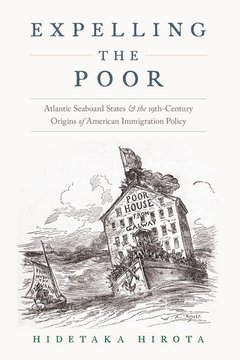Description
Expelling the Poor
Atlantic Seaboard States and the Nineteenth-Century Origins of American Immigration Policy
Author: Hirota Hidetaka
Language: English
Expelling the Poor
Publication date: 08-2019
320 p. · 23.1x15.5 cm · Paperback
Publication date: 08-2019
320 p. · 23.1x15.5 cm · Paperback
Expelling the Poor
Publication date: 02-2017
320 p. · 23.6x15.7 cm · Hardback
Publication date: 02-2017
320 p. · 23.6x15.7 cm · Hardback
Description
/li>Biography
/li>
Expelling the Poor examines the origins of immigration restriction in the United States, especially deportation policy. Based on an analysis of immigration policies in major American coastal states, including New York, Massachusetts, Pennsylvania, Maryland, Louisiana, and California, it provides the first sustained study of immigration control conducted by states prior to the introduction of federal immigration law in the late nineteenth century. The influx of impoverished Irish immigrants over the first half of the nineteenth century led nativists in New York and Massachusetts to develop policies for prohibiting the landing of destitute foreigners and deporting those already resident in the states to Europe, Canada, or other American states. No other coastal state engaged in immigration regulation with the same level of legislative effort and success as the two states. By locating the roots of American immigration control in cultural prejudice against the Irish and, more essentially, economic concerns about their poverty in nineteenth-century New York and Massachusetts, this book fundamentally revises the history of American immigration policy, which has largely focused on anti-Asian racism on the West Coast. By investigating state officials' practices of illegal removal, such as the overseas deportation of those who held American citizenship, this book reveals how the state-level treatment of destitute immigrants set precedents for the assertion by American officers of unrestricted power against undesirable aliens, which characterized later federal control. Beginning with Irish migrants' initial departure from Ireland, the book traces their transatlantic passage to North America, the process of their expulsion from the United States, and their post-deportation lives in Europe. In doing so, it places American nativism in a transnational context, demonstrating how American deportation policy operated as part of a broader legal culture of excluding non-producing members from societies in the north Atlantic world.
Hidetaka Hirota is a Visiting Assistant Professor of History at the City College of New York and formerly a Mellon Research Fellow in the Society of Fellows in the Humanities at Columbia University.
© 2024 LAVOISIER S.A.S.




